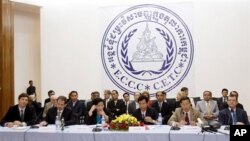The office of investigating judges at the Khmer Rouge tribunal is currently considering two controversial cases that would require five more indictments.
The investigating judges, Siegfried Blunk and You Bunleng, have said they have doubts as to whether the suspects are “most responsible” for atrocity crimes of the Khmer Rouge.
But officials say that question may not be relevant and is ambiguous.
“The statute of the court does not limit those within the term ‘most responsible,’” Monh Saphan, former chairman of the National Assembly committee that originally considered the court, said. “The court has the right to charge anybody, even the prison chiefs in other regions, or even the community chief, or even the head of security from any level, and so on.”
Muth Chantha, a former member of the UN’s negotiating team for the establishment of the court, said the idea was to find justice for the crimes of the regime.
“While negotiating, the United Nations did not want these key terms in the agreement of the establishment of the tribunal, giving the right to the court or investigating prosecutors or investigating judges to solely decide,” he said in a recent interview.
The Cambodian government, however, raised the issue of trying those most responsible, he said. “This means that the term ‘those most responsible’ refers to those who directly received orders or plans from the senior leaders of Democratic Kampuchea and implemented those orders or plans.”
Prosecutors say the five suspects in cases 003 and 004 were close enough to the leadership of the regime to be investigated.
According to the 2008 prosecution submission, which has been published internationally and a copy of which was obtained by VOA Khmer, those suspects are Meas Muth, former commander of the navy; Sou Met, former commander of the air force; Im Chaem, former district governor of Preah Neth Preah; Ta An, former deputy chief of the Central Zone; and Ta Tith, former secretary of Zone 1 and a member of the committee for the Northwestern Zone.
The investigating judges have so far not agreed. The court is currently considering an appeal by the international prosecutor that the judges investigate Meas Muth and Sou Met, in Case 003, more closely. The judges have not concluded their investigation into the three other suspects for Case 004.
Muth Chantha said there is no question the five additional suspects fall under court jurisdiction.
“Cases 003 and 004, which the international co-prosecutor initiated and sent to the investigating judges for further investigation, are still within the agreement on the establishment of the tribunal, and within the meanings of the two key terms—senior leaders and those most responsible,” he said.
He called the April conclusion by investigating judges of Case 003, which is under appeal, “very regretful.”
Monh Saphan too said the five suspects fall “within the legislation” passed by the National Assembly when the tribunal was established. “So it depends on either prosecutors or investigating judges to bring up the cases.”
The discretion of the prosecutors and judges has become an important question in recent weeks. Earlier this month, Blunk, the UN’s investigating judge, announced his resignation, saying comments against cases 003 and 004 made it too difficult to do his job.
Prime Minister Hun Sen and other top officials have repeatedly said in public statements they do not want the cases going forward, prompting a rebuke last week from the UN’s top legal representative.
Khieu Sorn, a former senator who voted to support the creation of the tribunal, said the court should be free to decide whom to prosecute and bring to trial.
“Do not interfere in the court’s work,” he said. Aside from the Tuol Sleng prison chief Duch, who has already been tried at the court, he said, “there are more perpetrators that have to be put on trial for the sake of seeking justice for Cambodian victims and revealing the truth about why Khmers killed Khmers.”
Nevertheless, the term “most responsible” has proven ambiguous.
The court statute is vague, said Kimsour Phirith, a National Assembly lawmaker for the Sam Rainsy Party who voted for the tribunal, which allows for some interpretation at the court.
“Because such definitions of the terms are not clear, the court’s work prosecuting the Khmer Rouge has been complicated,” he said. “The current government said only a few people of the Khmer Rouge regime are considered the most important leaders. For me, as a lawmaker, those few leaders are not enough.”




